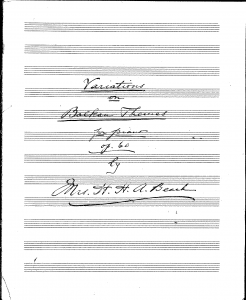Amy Beach (September 5, 1867–December 27, 1944) was an American composer and pianist. She was primarily self-taught in composition and was the first successful female composer of large works as well as the first president of the Society of American WomenComposers. She worked to further the works of young composers and was also known as “Mrs. H. H. A. Beach” at many of her concert piano performances.

This is the cover of a manuscript being held in the Amy Cheney Beach Collection, which is housed in the Dr. Kenneth J. LaBudde Department of Special Collections of the University of Missouri – Kansas City.
Amy Beach’s Variations on Balkan Themes, op. 60 was one of many great works she composed for piano. Based on songs “of unknown origin” collected by Reverend and Mrs. William W. Sleeper during their time living as missionaries in the Balkan region, the variations play upon “O Maiko Moya,” “Stara Planina,” and “Nasadil e Dado,” among other Balkan folk tunes. (Beach did not collect any of the folksongs her works were based on.) The variations employ switches between different themes to make up their complex texture.
The following is a loose translation of the text of “O Maiko Moya,” which is the first theme introduced in the work. Although there is no text to be sung or read with this work (this is a piano work, after all) this is important to the structure of the work and is suggestive of the overall tone of the variations and the cultural background that they were based on.
“O my poor country, to thy sons so dear,
Why art thou weeping, why this sadness drear?
Alas! thou raven, messenger of woe,
Over those fresh grave moanest thou so?”
The different folk songs do not all have to deal with Balkan nationalistic pride, rather, some texts relate to the mountains, or a story of a grandfather planting a small garden. As is the case in any piece written as a theme with variations, the variations gradually move away from the original motivic elements and provide new context for different themes.
In her analysis of Beach’s Variations on Balkan Themes, Dr. Adrienne Fried Block suggested that Beach borrowed from Beethoven’s tonal scheme for his Six Variations, op. 34. Beethoven’s Variations was one of the pieces that Beach regularly performed in her solo piano performances and one of the few variations that she regularly played throughout her career. It makes sense then, that this piece had such an effect on her own music. The Balkan Themes were in minor, which affected the tonal adjustments she made to the piece and prevented her from using Beethoven’s Variations structure exactly as it is (it should be noted that the speculation that Beach borrowed from Beethoven is a part of Dr. Block’s correspondence to a E. Douglas Bomberger).
Overall, Beach’s Variations are lively, yet melancholy in mood. Beach was known to incorporate romanticism and delayed resolution into her work, later on moving away from tonality. It is no surprise that Beach has been declared the first successful American female composer of large-scale music, although I think it would be interesting to explore the published music of other female composers and try to understand where they “fell short” of the success of their male counterparts, causing America to have to wait until the late 1800s for a female composer of Beach’s accomplishment.
Beach, Amy. Variations on Balkan Themes, op. 60. Boston: Arthur P. Schmidt, 1906. http://javanese.imslp.info/files/imglnks/usimg/0/0f/IMSLP08550-Beach_-_Op.60__Variations_on_Balkan_Themes.pdf.
Beach, Amy. Variations on Balkan Themes, op. 60. Performed by Virginia Eskin. Composed 1904.
Bomberger, E. Douglas, and Adrienne Fried Block. “On Beach’s Variations on Balkan Themes, op. 60.” American Music 11, no. 3 (1993): 368-71. http://www.jstor.org/stable/3052509.
